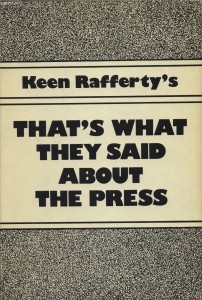‘Almost holy’: 14 quotes about newspapers and journalism
 My library is stuffed with books (remember those?) about journalism. From the shelves I plucked “That’s What They Said about the Press” by Keen Rafferty (Vantage, 1975). Rafferty was head of the copy desk at the Baltimore Sun after only three years in the business (or so his bio says) and head of the University of New Mexico’s journalism program. “That’s What They Said…” is a collection of quotes about journalism, particularly newspapers. It has all the familiar ones about afflicting the comfortable and raising hell, along with others that were mostly new to me. (Although Google assures me that my unfamiliarity only proves my woeful separation from the zeitgeist.)
My library is stuffed with books (remember those?) about journalism. From the shelves I plucked “That’s What They Said about the Press” by Keen Rafferty (Vantage, 1975). Rafferty was head of the copy desk at the Baltimore Sun after only three years in the business (or so his bio says) and head of the University of New Mexico’s journalism program. “That’s What They Said…” is a collection of quotes about journalism, particularly newspapers. It has all the familiar ones about afflicting the comfortable and raising hell, along with others that were mostly new to me. (Although Google assures me that my unfamiliarity only proves my woeful separation from the zeitgeist.)
The [American] press, which is mostly controlled by vested interests, has an excessive influence on public opinion.
— Albert Einstein, 1921
Whatever they say about us, they can’t control us. We’re out to serve the public. That’s a red-blooded, virile statement, and by God, it’s true.
— Harry Grant, Milwaukee Journal
Most of the readers I talk to are far more biased in their political views than the newspapers they read.
— Samuel Lubell, pollster
Judgment sits on the copy desk; skepticism on his right hand, good sense on his left. Whether you have a one-man desk, or ten … around the rim, he or they are the reporter’s best critic, the writer’s conscience. … I salute the copy desk, the sacrificial altar of the sacred cow.
— Merritt L. Johnson, Chicago Daily News
He wrote for divers papers, which, as everybody knows / Is worse than serving in a shop or scaring off the crows.
— Rudyard Kipling
To the wholesome training of severe newspaper work, when I was a very young man, I constantly refer my first successes.
— Charles Dickens
The function of the press is very high. It is almost holy.
— Justice Louis D. Brandeis
Blessed be they who never see a newspaper, for they shall see Nature, and, through her, God.
— Henry David Thoreau
What is to prevent a newspaper from being made the greatest organ of social life? Books have had their day — the temple of religion has had its day. A newspaper can be made to take the lead of all these in the great movements of human thought and of human civilization.
— James Gorden Bennett, New York Herald
A newspaper makes the multitude too familiar with the actions and councils of their supporters and gives them not only an itch but a kind of colorable right and license to be meddling with the government.
— Roger L’Estrange, Licenser of the Press
The man who never looks into a newspaper is better informed than he who reads them, inasmuch as he who knows nothing is nearer to truth than he whose mind is filled with falsehoods and errors.
— Thomas Jefferson
The only security of all is in a free press.
— Thomas Jefferson
Newspapers always excite curiosity. No one ever lays one down without a feeling of disappointment.
— Charles Lamb
A newspaper consists of just the same number of words, whether there be any news in it or not.
— Henry Fielding

Marissa,
Journalism has its own ethical issues. They tend to be more visible than those you describe in counseling — more visible to the public, that is. And the consequences for challenging your superiors are often not as drastic as those you mention. In other words: Journalism isn’t a paradise, but I never felt forced to compromise my principles.
The current turmoil in journalism means no job is a guarantee, and finding a well-paid job — even if you have experience in the craft — is tough. On the other hand, it also means many old and new media organizations are willing to take chances, including in hiring. And the best advice for any job hunter in journalism is simple: Bring proof. Seize whatever opportunities you can find, paid or unpaid, to get your writing on the record. As much as possible, make that writing backed by original reporting, not just opinions, musings and personal anecdotes.